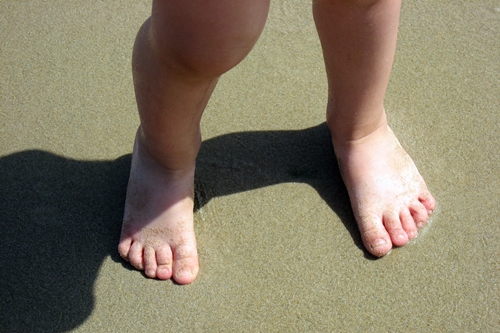30 July 2015. Results of an intermediate-stage clinical trial show a drug candidate to treat growth hormone deficiency in children given once a week, works about as well as a current therapy requiring a daily injection. The results were released by Ascendis Pharma A/S, a specialty pharmaceutical company in Copenhagen, Denmark that conducted the trial.
Growth hormone deficiency occurs when the pituitary gland, located at the base of the brain, does not make enough growth hormone for a child to grow normally. Children with growth hormone deficiency often have a short stature, metabolic difficulties, and slower cognitive development, leading to a poor quality of life. Growth hormone deficiency can lead to delayed puberty, if left untreated.
Treatments today require daily injections of human growth hormone over long periods of time. The daily injection requirement often puts emotional burdens on parents and difficulties keeping with the daily injection schedule.
Ascendis Pharma develops prodrugs, inactive precursor compounds derived from active drug molecules that require exposure to enzymes or other chemicals in the body to activate. The company’s TransCon technology produces prodrugs designed to release proteins, peptides, or small molecules over an extended period of time. The technology includes a linker that responds to pH levels and temperature to release the active ingredients over a specified period, as well as a carrier designed to release its payloads either locally or systemically.
The clinical trial tested TransCon Growth Hormone, Ascendis’s treatment candidate for human growth hormone deficiency in children, formulated as an injection given once a week, against Genotropin, a current drug given daily. Both treatments are administered with an injection under the skin. The 53 participants were children in Europe and Egypt, ages 3 to 12, with growth hormone deficiency. The children enrolled in the trial were randomized to receive one of three dosage levels of TransCon Growth Hormone or Genotropin, over a 26-week period.
The trial looked primarily at the safety and tolerability of TransCon Growth Hormone, including number of serious adverse reactions, incidence of human growth hormone antibodies, and injection site reactions. The results show no serious adverse or unexpected reactions related to the drug. In addition, injection site reactions were mild and similar to those fond with Genotropin. And incidences of human growth hormone antibodies were found to be similar to those generally reported for daily growth hormone injections.
The study also measured changes in height velocity, or rate of growth in height, which the researchers found for TransCon Growth Hormone at all three dosage levels to be similar to Genotropin. Likewise, concentrations of human growth hormone in the blood and increases in levels of insulin-like growth factor-1 — a hormone that contributes to bone and tissue growth — were similar between individuals receiving TransCon Growth Hormone and Genotropin, or consistent with expectations.
Read more:
- FDA Clears Trial of Fibrosis Drug for Muscular Dystrophy
- Patient Registry Started for Rare Genetic Disorder
- Rare Disease Therapy Company Raises $60 Million in IPO
- Trial Begins Testing Sickle Cell Blood Therapy
- FDA Approves Pediatric HIV Drug Formulation
* * *


 RSS - Posts
RSS - Posts
You must be logged in to post a comment.